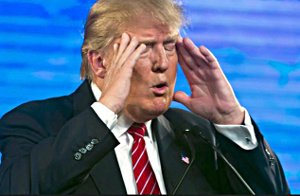Yesterday, the revelations that President Trump had revealed “top secret” intelligence during Russian Foreign Minister Sergey Lavrov’s visit were met with blanket denials from the White House. The insistence that it didn’t happen didn’t last long, as President Trump took to Twitter not long thereafter to affirm that he did so.
 Trump insisted that because the intelligence had to do with terrorism and airline safety, which is to say the ISIS laptop bomb plot, there were valid “humanitarian reasons” to share that intelligence with Russia to allow them to step up their defenses against an ISIS attack.
Trump insisted that because the intelligence had to do with terrorism and airline safety, which is to say the ISIS laptop bomb plot, there were valid “humanitarian reasons” to share that intelligence with Russia to allow them to step up their defenses against an ISIS attack.
Trump went on to point out that as president he has an “absolute right” to share intelligence, which despite the furor the report caused is true. US presidents are allowed to handle classified data as they see fit, and that includes disclosing it to foreign officials.
The whole reason this became an issue is because the nation is question was Russia and many, particularly in the US Congress, are perpetually hostile toward Russia and would oppose any intelligence sharing with them, irrespective of its justification.
That Trump met with the Russian Foreign Minister at all was a sore spot for some, even though literally every US president in the modern era has done so, with Rep. Stephanie Murphy (D – FL) insisting that there was “no such thing as appropriate contact” with the Russian government.
Ultimately, there is no legal question surrounding Trump’s revelation, and National Security Adviser H.R. McMaster says he believes the disclosures by Trump were “wholly appropriate,” though the fact that it’s a story with Trump and Russia in the headlines inevitably means it was going to be a scandal.
Trump’s actual disclosure appears comparatively minor, having discussed a laptop plot that’s been public knowledge for months, and citing intelligence from a foreign operative in an unnamed city in Syria. Officials interested in making a big deal of that subsequently revealed the city would’ve tipped the Russians off that the source was Israeli, though in doing so the officials also tipped off the entire planet to that fact.
At most Trump gave Russia an inadvertent heads up that Israel had a spy in ISIS territory in Syria, something they’d likely have assumed at any rate, and it is primarily the inherent distrust of all things Russian that has led to speculation this is going to lead to any sort of fallout from that fact.


